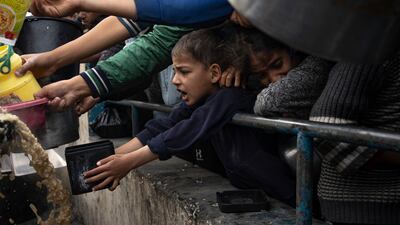Live updates: Follow the latest news on Israel-Gaza
Gaza could face famine within six months unless access to food, water and sanitation is restored, according to UN agencies' data.
More than one in four households in Gaza are facing extreme hunger, according to the study by the Integrated Food Security Phase Classification, the UN's hunger monitoring system.
Data collected from UN agencies including the World Food Programme showed the entire population of Gaza, about 2.2 million people, is facing at least crisis levels of food insecurity after more than two months of war.
The World Food Programme warned that everyone in the enclave is now at risk of starvation.
If the conflict continues and humanitarian relief remains restricted, there is a danger that famine will occur within the next six months, the report said.
“The WFP has warned of this coming catastrophe for weeks. Tragically, without the safe, consistent access we have been calling for, the situation is desperate and no one in Gaza is safe from starvation,” WFP executive director Cindy McCain said.
Food security experts at the agency had already established that Gazans have used up all their resources, while livelihoods have collapsed, bakeries have been destroyed and shops are empty.
“This announcement about the risk of famine in Gaza is sobering but not surprising,” UN aid chief Martin Griffiths said.
“We have been warning for weeks that, with such deprivation and destruction, each day that goes by will only bring more hunger, disease and despair to the people of Gaza.”
The IPC report was released on Thursday as the UN Security Council once again postponed voting on a resolution seeking to ensure the delivery of humanitarian assistance to Gaza. The council was expected to hold the vote on Friday.
The report said more than 90 per cent of the population in the Gaza Strip, about 2.08 million people, was estimated to have faced high levels of acute food insecurity between November 24 and December 7.
Of these, more than 40 per cent, 939,000 people, were classified as being in a state of “emergency”, meaning that they faced either “large food consumption gaps that are reflected in very high acute malnutrition and excess mortality; or are able to mitigate large food consumption gaps but only by employing emergency livelihood strategies and asset liquidation”.
More than 15 per cent, 378,000 people, were in “catastrophe”, the IPC said, which it categorises as “extreme lack of food and/or other basic needs even after full employment of coping strategies”.
More than 20,000 people have been killed in Gaza since the Israeli military launched its offensive in response to attacks by Hamas, the Palestinian militant group that rules the enclave, in southern Israel on October 7 that claimed about 1,200 lives.
The conflict has displaced most of Gaza's population and devastated its infrastructure, particularly health facilities. The delivery of aid into the territory has been slowed by strict Israeli checks.
Amid mounting international pressure, Israel recently opened the Kerem Shalom border crossing to increase the flow of aid, but this was suspended on Thursday after an Israeli strike on the Gaza side of the crossing.
The UN Secretary General's spokesman, Stephane Dujarric, said the United Nations agency for Palestinian refugees, UNRWA, was “unable to receive [aid] trucks” via Kerem Shalom following the “drone strike” and the WFP had suspended operations at the crossing.
Mr Dujarric's comments came after Israeli President Isaac Herzog said the country could enable “even 400 trucks a day” of aid and blamed the UN for failing to bring more.


